|
|
Curfew Must Not Ring Tonight after a poem by Rose Hartwick Thorpe. |
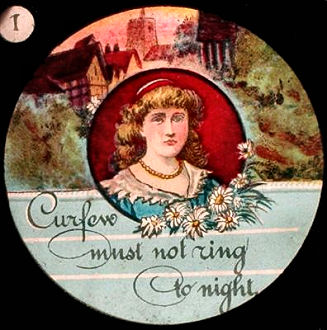
|
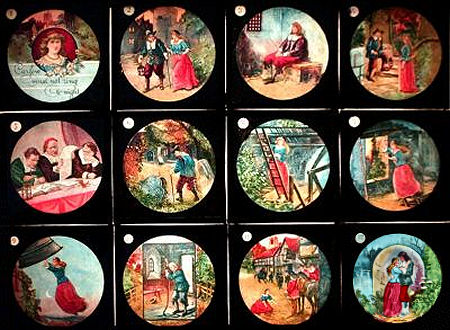 |
||||
|
Curfew Must Not Ring Tonight
is a narrative poem by Rose Hartwick Thorpe (1850-1939) that was
written in 1867. It tells the sad story of a young and beautiful forester daughter called Bessie whose lover Basil
Underwood has been captured by the Puritans and thrown in prison.
The judge sentenced him to be shot as a spy that night when the curfew bell rings.
Knowing that Oliver Cromwell, the English military and political leader during the English Civil War,
will be late in arriving, the young woman
begs the old sexton to prevent the ringing of the curfew bell. The old man
refuses, after which Bessie heroically climbs to the top of the bell tower,
risking her life. There she succeeds to manually prevent the bell from ringing
and so delays the execution.
When Cromwell arrives and hears of her courageous action he is so touched that he
immediately issues a pardon for her friend. Thorpe based the poem on a story called "Love and Loyalty" that she found in a woman's periodical which she read avidly. It was one of the most popular poems of the 19th century and was said to be a favourite of Queen Victoria, but it has since faded into obscurity. Thorpe initially called it "Bessie and the Curfew", but ditched that dull title for the haunting refrain "Curfew Must Not Ring Tonight", which probably helped its immense popularity. Three films based on the poem were made, but never a sound version. |
|||||
| Note: To be declaimed in a heartfelt manner by the lanternist. | |||||
|
Slowly England's sun was setting o'er the hilltops far away, Filling all the land with beauty at the close of one sad day; And its last rays kissed the forehead of a man and maiden fair -- He with steps so slow and weary; she with sunny, floating hair; He with bowed head, sad and thoughtful, she, with lips all cold and white, Struggling to keep back the murmur, "Curfew must not ring tonight!" |
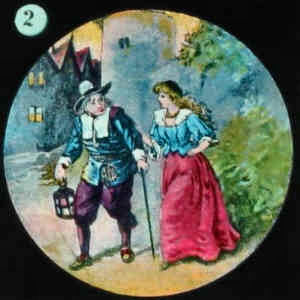 |
||||
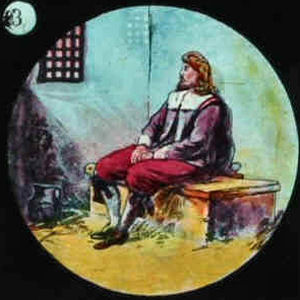 |
"Sexton," Bessie's white
lips faltered, pointing to the prison old, With its walls tall and gloomy, moss-grown walls dark, damp and cold -- "I've a lover in the prison, doomed this very night to die At the ringing of the curfew, and no earthly help is nigh. Cromwell will not come till sunset;" and her lips grew strangely white, As she spoke in husky whispers, "Curfew must not ring tonight!" |
||||
|
"Bessie," calmly spoke
the sexton (every word pierced her young heart Like a gleaming death-winged arrow, like a deadly poisoned dart), "Long, long years I've rung the curfew from that gloomy, shadowed tower; Every evening, just at sunset, it has tolled the twilight hour. I have done my duty ever, tried to do it just and right: Now I'm old, I will not miss it. Curfew bell must ring tonight!" |
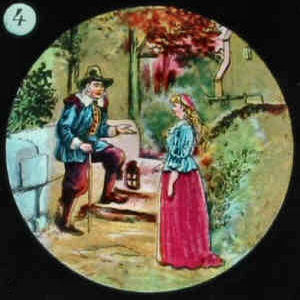 |
||||
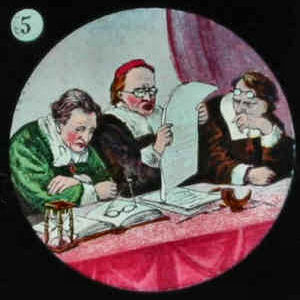 |
Wild her eyes and pale
her features, stern and white her thoughtful brow, As within her secret bosom, Bessie made a solemn vow. She had listened while the judges read, without a tear or sigh, "At the ringing of the curfew, Basil Underwood must die." And her breath came fast and faster, and her eyes grew large and bright; One low murmur, faintly spoken. "Curfew must not ring tonight!" |
||||
|
She with quick step
bounded forward, sprang within the old church-door, Left the old man coming slowly, paths he'd trod so oft before. Not one moment paused the maiden, But with eye and cheek aglow, Staggered up the gloomy tower, where the bell swung to and fro; As she climbed the slimy ladder, on which fell no ray of light, Upward still, her pale lips saying, "Curfew shall not ring tonight!" |
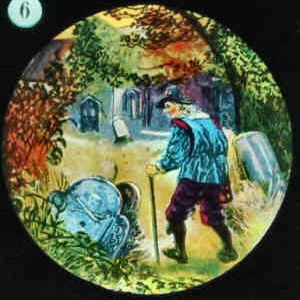 |
||||
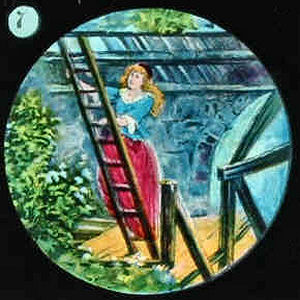 |
She has reached the
topmost ladder, o'er her hangs the great dark bell; Awful is the gloom beneath her, like the pathway down to hell. See! the ponderous tongue is swinging; 'tis the hour of curfew now, And the sight has chilled her bosom, stopped her breath, and paled her brow. Shall she let it ring? No, never! Her eyes flash with sudden light, As she springs, and grasps it firmly: "Curfew shall not ring tonight!" |
||||
|
Out she swung -- far out.
The city seemed a speck of light below -- There twixt heaven and earth suspended, as the bell swung to and fro. And the sexton at the bell-rope, old and deaf, heard not the bell, Sadly thought that twilight curfew rang young Basil's funeral knell. Still the maiden, clinging firmly, quivering lip and fair face white, Stilled her frightened heart's wild throbbing: "Curfew shall not ring tonight!" |
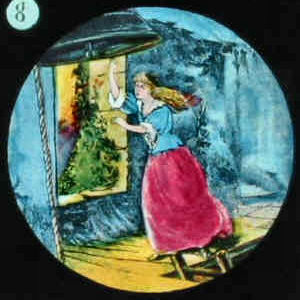 |
||||
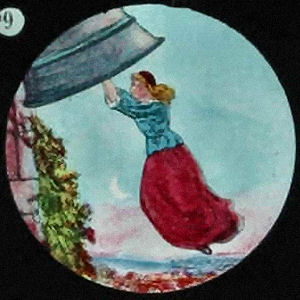 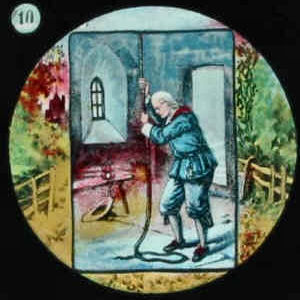 |
It was o'er, the bell
ceased swaying; and the maiden stepped once more Firmly on the damp old ladder, where, for hundred years before, Human foot had not been planted. The brave deed that she had done Should be told long ages after. As the rays of setting sun Light the sky with golden beauty, aged sires, with heads of white, Tell the children why the curfew did not ring that one sad night. |
||||
|
O'er the distant hills
comes Cromwell. Bessie sees him; and her brow, Lately white with sickening horror, has no anxious traces now. At his feet she tells her story, shows her hands, all bruised and torn; And her sweet young face, still haggard, with the anguish it had worn, Touched his heart with sudden pity, lit his eyes with misty light. "Go! your lover lives," said Cromwell. "Curfew shall not ring tonight!" |
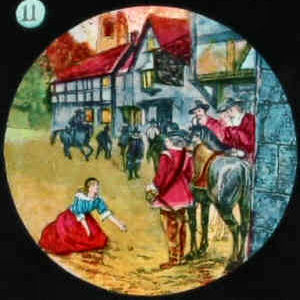 |
||||
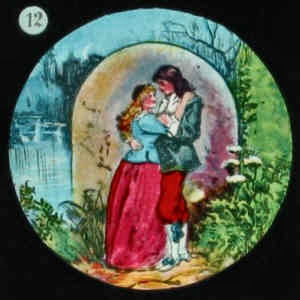 |
Wide they flung the
massive portals, led the prisoner forth to die, All his bright young life before him. Neath the darkening English sky, Bessie came, with flying footsteps, eyes aglow with lovelight sweet; Kneeling on the turf beside him, laid his pardon at his feet. In his brave, strong arms he clasped her, kissed the face upturned and white, Whispered, "Darling, you have saved me, curfew will not ring tonight." |
||||
|
|
||
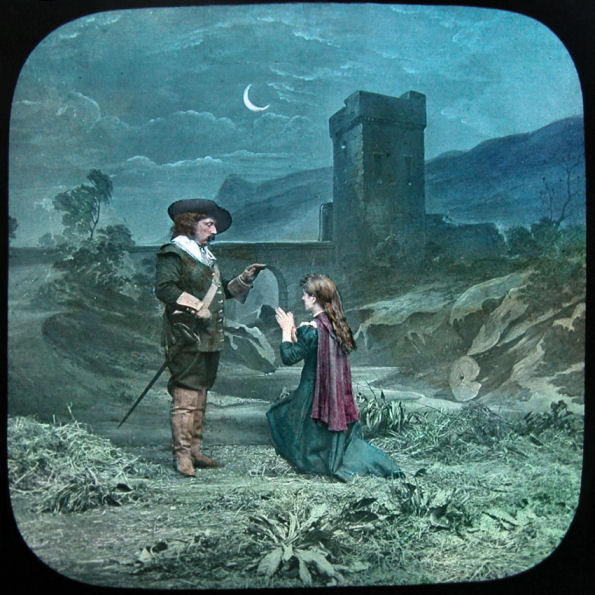 |
||
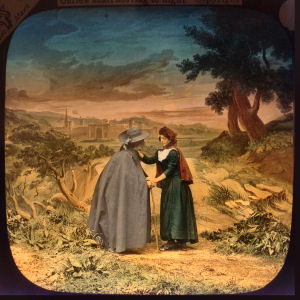 |
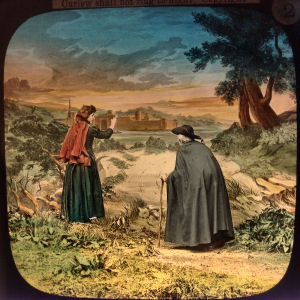 |
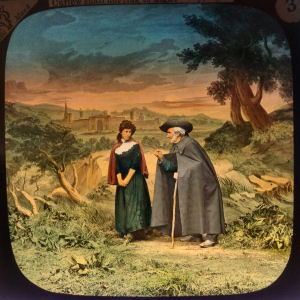 |
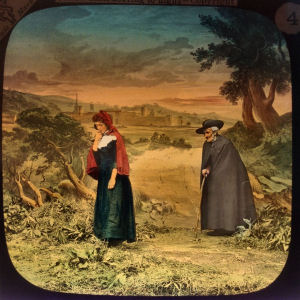 |
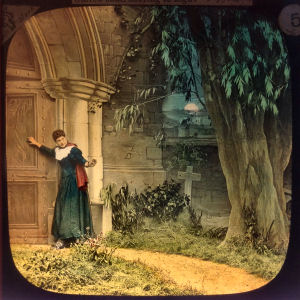 |
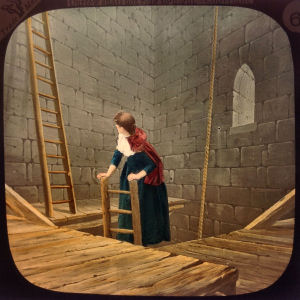 |
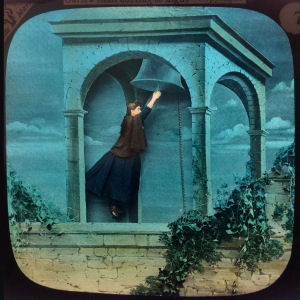 |
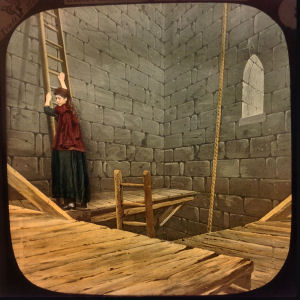 |
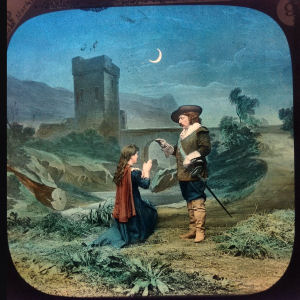 |
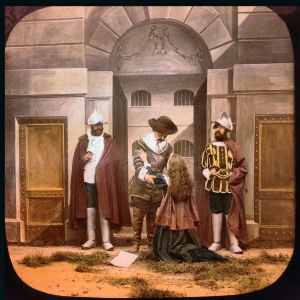 |
 A
wonderful series of ten slides called 'Curfew shall not
ring tonight, made by the English company York & Son. From 1890 the firm used as
their trade mark a "Y" with a snake entwined, set inside a triangle. A
wonderful series of ten slides called 'Curfew shall not
ring tonight, made by the English company York & Son. From 1890 the firm used as
their trade mark a "Y" with a snake entwined, set inside a triangle. |
|
|
How could we better end this small survey on magic-lantern
slides that illustrate the story "Curfew Must Not Right Tonight," by one of the
more then 2,000 slides that were drawn by America's foremost lantern artist
Joseph Boggs Beale. Beale was a master at creating story-telling images that
captured the dramatic moment, and sustained attention with extraordinary detail.
He was one of the few nineteenth-century artists who created artwork expressly
for reproduction on magic lantern slides.
His work for magic lantern slides was done entirely in black, white and shades
of grey and he left it to the various optical companies that reproduced his work
to tint the individual slides. This magic lantern slide is a real piece of art. The slide has the standard American size, 3.25" x 4" and is hand coloured. |
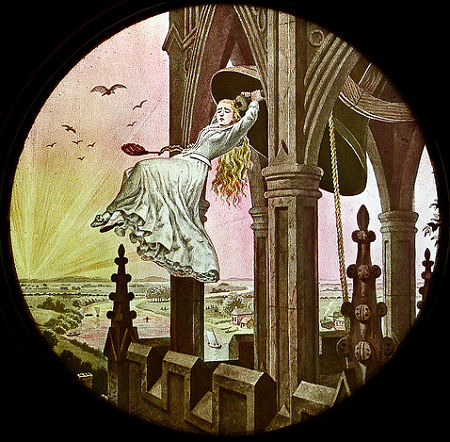 |
|
| |
©1997-2021 'de Luikerwaal' All rights reserved. Last update: 15-05-2021. |